初中语法讲解系列(附练习)-动词1(实义动词、连系动词、助动词)
初中英语语法全解全练:中考英语语法专项复习动词分类及短语
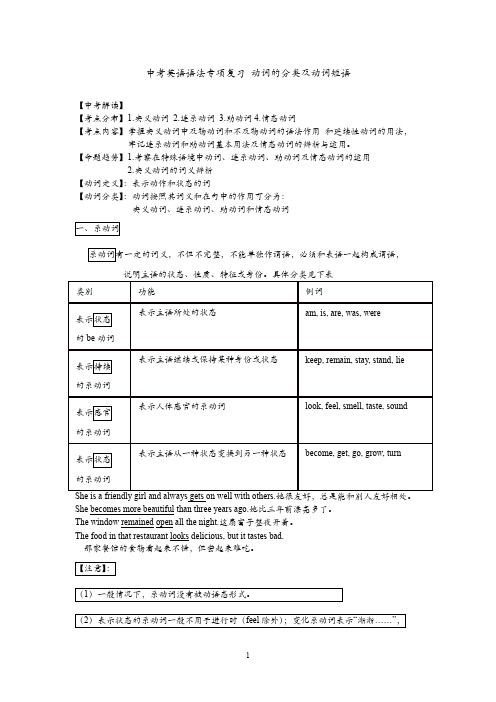
中考英语语法专项复习动词的分类及动词短语【中考解读】【考点分布】1.实义动词2.连系动词3.助动词4.情态动词【考点内容】掌握实义动词中及物动词和不及物动词的语法作用和延续性动词的用法,牢记连系动词和助动词基本用法及情态动词的辨析与运用。
【命题趋势】1.考察在特殊语境中动词、连系动词、助动词及情态动词的运用2.实义动词的词义辨析【动词定义】:表示动作和状态的词【动词分类】:动词按照其词义和在句中的作用可分为:说明主语的状态、性质、特征或身份。
具体分类见下表She is a friendly girl and always gets on well with others.She becomes more beautiful than three years ago.她比三年前漂亮多了。
The window remained open all the night.这扇窗子整夜开着。
The food in that restaurant looks delicious, but it tastes bad.那家餐馆的食物看起来不错,但尝起来难吃。
It’s getting warmer and warmer.天气渐渐变得暖和。
[同步练习]①—The oranges ____________sweet.—Of course. They are from Yongxing, Chenzhou.A.tasteB. eatC. drink②—Why do you ______ so upset?—Because I didn’t get the first place in the English competition.A.lookB.soundC.smellD. feel① —Hello, Lisa. What's the matter?—I ______find my mobile phone. _______ you seen it?A.couldn't; DidB. can't; HaveC. need ; HadD. must; Are ②—Who _____ the first paper in the world?—Cai Lun______A.invented;didB.was invented;wasC.did invented ;wasD.invented;was .③“重要的事情说三遍” can be translated into “Important things must beagain and again and again.”A. spokenB. repeatedC. describedD. introduced Key:B,A,B 三 实义动词实义动词分为及物动词和不及物动词Could I use your computer ?Vegetables help you to keep in good health.make sb do sth let sb do sth have sb do sthsee sb. do sth watch sb. do sth hear sb.do sth notice sb. do sth Tom lent me a book yesterday. 【拓展】 具有类似用法的还有:give sb.sth.= give sth.to sb. pass sb.sth.= pass sth.to sb. post sb.sth.= post sth.to sb. lend give sb.sth.= lend sth.to sb.offer sb.sth.= offer sth.to sb. buy sb.sth.= buy sth.for sb.Tom arrived last Sunday.He talks in a loud voice.She can sing English songs.(及物)She sings well.(不及物)I often listen to music on weekends.She can sing English songs.(及物)She sings well.(不及物)1)动词+介词Tom is looking for his lost pen.What are you talking about?介词之间。
英语动词(一)实义动词、连系动词、助动词

词法词类间的相互关系:1、adj./num./n.可以修饰n.2、adj.可以修饰pron.3、adv.可以修饰v./adj./adv.4、art.接n.5、prep.接n./pron.构成介词短语,共同作句子成分动词(一)【按功能分为——实义动词、连系动词、助动词、情态动词】一、实义动词(表示行为,又称“行为动词”)1、vt及物动词与vi不及物动词(1)vt及物动词(后面能带宾语,大多数动词都是及物动词。
)1)跟双宾语的及物动词。
通常,人(间接宾语)在前,物(直接宾语)在后,“do sb. sth.”。
反之,间接宾语前需加介词。
2)跟复合宾语的及物动词(宾语后必须再加宾语补足语,其意义才完整)(2)vi不及物动词(不能跟宾语。
大多数动词既可作及物动词,又可作不及物动词,纯不及物动词很少。
)常用不及物动词有:ache疼痛、agree、arrive、come、dance、die、disappear、dream、run、sit、stand、say、wait、walk、smile、cry Don't run.There's plenty of time.不要跑,还有足够的时间呢。
The boy smiled when he saw his mother.见到他妈妈,男孩笑了。
We waited until Mom came.我们一直等到妈妈来。
(3)很多实义动词既可以作及物动词,也可以作不及物动词,这样的动词有两种不同的情况:1)作及物动词和不及物动词时,意义相同。
如:read、sing、begin、eat、drink、know、help、tryShall we begin at once?我们可以立刻开始吗?Lucy began working as a librarian after she left school.露西毕业后开始当图书馆管理员。
2)作及物动词和不及物动词时,意义不同。
中考查漏补缺英语语法之动词语法讲解
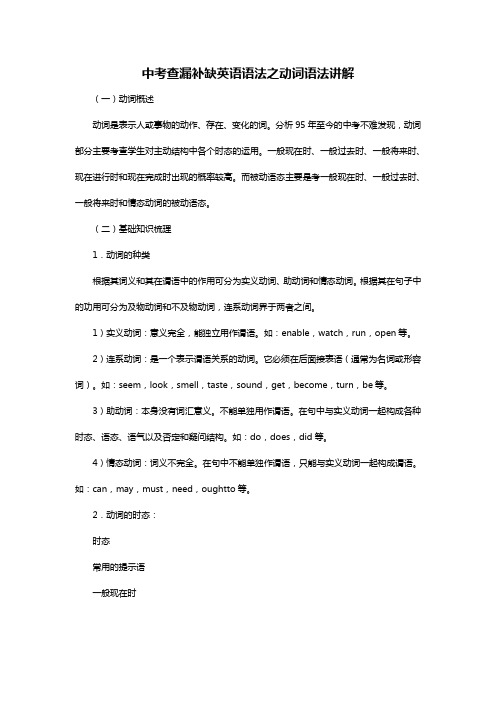
中考查漏补缺英语语法之动词语法讲解(一)动词概述动词是表示人或事物的动作、存在、变化的词。
分析95年至今的中考不难发现,动词部分主要考查学生对主动结构中各个时态的运用。
一般现在时、一般过去时、一般将来时、现在进行时和现在完成时出现的概率较高。
而被动语态主要是考一般现在时、一般过去时、一般将来时和情态动词的被动语态。
(二)基础知识梳理1.动词的种类根据其词义和其在谓语中的作用可分为实义动词、助动词和情态动词。
根据其在句子中的功用可分为及物动词和不及物动词,连系动词界于两者之间。
1)实义动词:意义完全,能独立用作谓语。
如:enable,watch,run,open等。
2)连系动词:是一个表示谓语关系的动词。
它必须在后面接表语(通常为名词或形容词)。
如:seem,look,smell,taste,sound,get,become,turn,be等。
3)助动词:本身没有词汇意义。
不能单独用作谓语。
在句中与实义动词一起构成各种时态、语态、语气以及否定和疑问结构。
如:do,does,did等。
4)情态动词:词义不完全。
在句中不能单独作谓语,只能与实义动词一起构成谓语。
如:can,may,must,need,oughtto等。
2.动词的时态:时态常用的提示语一般现在时always,usually,sometimes,often,every,onceaweek,inthemorning,inDecember,inspring,onMondays等。
一般过去时ago,justnow,before2005,yesterday,lastFriday,once,theotherday,thosedays,onceuponatime,longbefore等。
一般将来时tomorrow,thecoming...,inthefuture,nextTuesday,intwohours,someday,soon,beforelong,thisevening等。
初中英语2025届中考动词考点分类讲解练习(实义动词+系动词+助动词+情态动词)
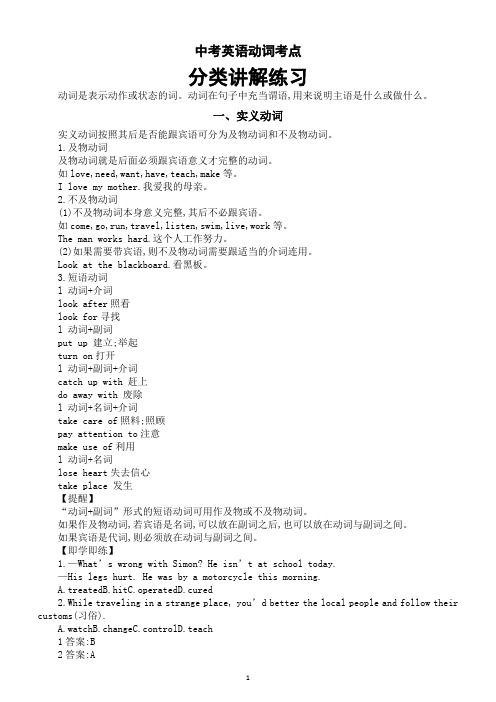
中考英语动词考点分类讲解练习动词是表示动作或状态的词。
动词在句子中充当谓语,用来说明主语是什么或做什么。
一、实义动词实义动词按照其后是否能跟宾语可分为及物动词和不及物动词。
1.及物动词及物动词就是后面必须跟宾语意义才完整的动词。
如love,need,want,have,teach,make等。
I love my mother.我爱我的母亲。
2.不及物动词(1)不及物动词本身意义完整,其后不必跟宾语。
如come,go,run,travel,listen,swim,live,work等。
The man works hard.这个人工作努力。
(2)如果需要带宾语,则不及物动词需要跟适当的介词连用。
Look at the blackboard.看黑板。
3.短语动词l 动词+介词look after照看look for寻找l 动词+副词put up 建立;举起turn on打开l 动词+副词+介词catch up with 赶上do away with 废除l 动词+名词+介词take care of照料;照顾pay attention to注意make use of利用l 动词+名词lose heart失去信心take place 发生【提醒】“动词+副词”形式的短语动词可用作及物或不及物动词。
如果作及物动词,若宾语是名词,可以放在副词之后,也可以放在动词与副词之间。
如果宾语是代词,则必须放在动词与副词之间。
【即学即练】1.—What’s wrong with Simon? He isn’t at school today.—His legs hurt. He was by a motorcycle this morning.A.treatedB.hitC.operatedD.cured2.While traveling in a strange place, you’d better the local people and follow their customs(习俗).A.watchB.changeC.controlD.teach1答案:B2答案:A二、系动词系动词不能单独作谓语,必须与表语一起构成谓语。
初中语法-动词的分类
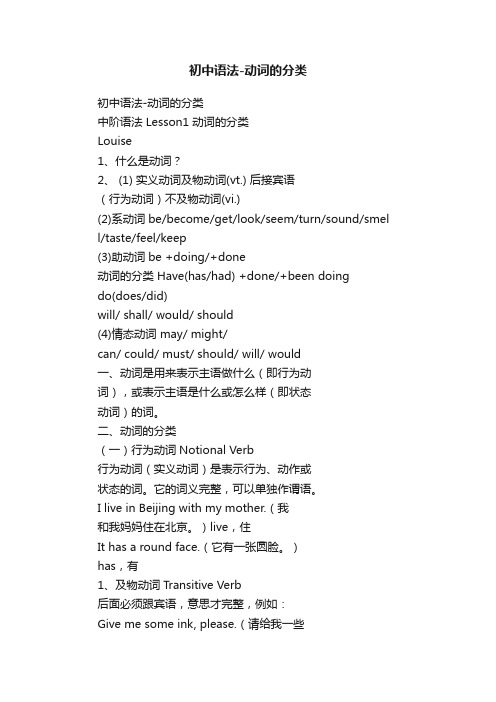
初中语法-动词的分类初中语法-动词的分类中阶语法 Lesson1 动词的分类Louise1、什么是动词?2、 (1) 实义动词及物动词(vt.) 后接宾语(行为动词)不及物动词(vi.)(2)系动词be/become/get/look/seem/turn/sound/smel l/taste/feel/keep(3)助动词be +doing/+done动词的分类 Have(has/had) +done/+been doingdo(does/did)will/ shall/ would/ should(4)情态动词 may/ might/can/ could/ must/ should/ will/ would一、动词是用来表示主语做什么(即行为动词),或表示主语是什么或怎么样(即状态动词)的词。
二、动词的分类(一)行为动词Notional Verb行为动词(实义动词)是表示行为、动作或状态的词。
它的词义完整,可以单独作谓语。
I live in Beijing with my mother.(我和我妈妈住在北京。
)live,住It has a round face.(它有一张圆脸。
)has,有1、及物动词Transitive Verb后面必须跟宾语,意思才完整,例如:Give me some ink, please.(请给我一些墨水。
)If you have any questions, you can raiseyour hands.(如果你们有问题,你们可以举手,。
)2、不及物动词Intransitive Verb后面不能跟宾语,意思已完整。
不及物动词有时可以加上副词或介词,构成短语动词,相当于一个及物动词。
例如:He works hard.(他工作努力。
)Jack runs faster than Mike.(杰克跑步比迈克要快些。
)Please look at the blackboard and listen to me.(请看黑板,听我说。
初中英语动词讲解

动词的分类
• 一、动词的分类、基本形式和用法 • 英语的动词按作用分为实意动词、连系动 词、助动词和情态动词。
一)实意动词
• • • • 一) 实意动词按其是否能直接跟宾语分作及物动词和不 及物动词。 1.及物动词。在句中必须跟宾语才能表达完整意思的实 意动词叫及物动词,它后必须跟宾语,如: I can hear you. hear单独用不能表达完整的意思为 及物动词 I have a book. have单独用不能表达完成的意思为 及物动词。 2.不及物动词。在句中不必跟宾语就能表达完整意思 的动词,如: He left yesterday. leave单独用能表达完整的意思,是 不及物动词。
三)实意动词的形式和用法:
• does, do, doing, did, done • 这几种形式产生了谓语形式和非谓语形式: • 谓语形式:即通过添加助动词构成不同时态,如: • does, do, did, be doing, have done, be done • 非谓语形式:to do, do, doing, done
三、助动词
• 一)助动词本身无词义,不能独立充当谓 语,只能帮助实意动词和不是be的系动词 构成谓语。助动词有四类:be; shall,will; have; do。
1.助动词be的基本形式和用法:
• • • • • 原形:be (情态动词后) 现在式:am, is,are (构成现在进行时或被动式) 过去式:was, were, (构成过去进行时被动式) 现在分词:being (被动进行时) 过去分词:been (完成时或被动式)
2.shall(第一人称),will(二、三人称)帮助动词构成将来 时态。should,would是它们的过去式形式,帮助构成过去将 来时。 3.have构成各种完成时: have(has)帮助构成现在完成时。 had帮助构成过去完成时。 4.do帮助动词构成一般现在时和一般过去时的否定结构和 疑问结构。有do,does,did三种形式。
初中英语动词分类讲解
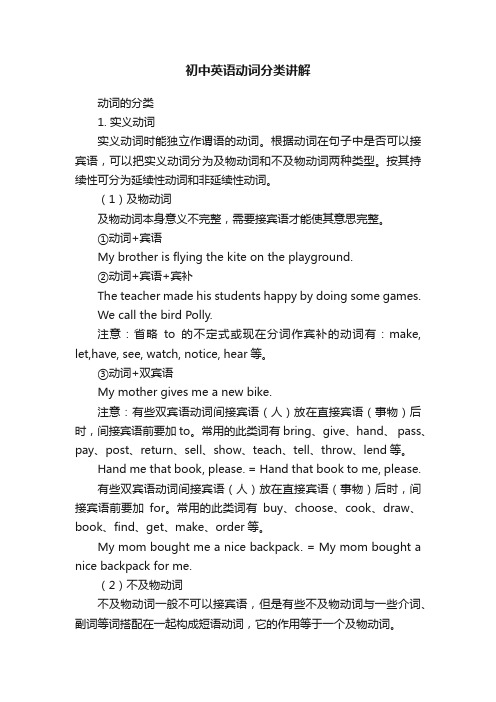
初中英语动词分类讲解动词的分类1. 实义动词实义动词时能独立作谓语的动词。
根据动词在句子中是否可以接宾语,可以把实义动词分为及物动词和不及物动词两种类型。
按其持续性可分为延续性动词和非延续性动词。
(1)及物动词及物动词本身意义不完整,需要接宾语才能使其意思完整。
①动词+宾语My brother is flying the kite on the playground.②动词+宾语+宾补The teacher made his students happy by doing some games.We call the bird Polly.注意:省略to的不定式或现在分词作宾补的动词有:make, let,have, see, watch, notice, hear等。
③动词+双宾语My mother gives me a new bike.注意:有些双宾语动词间接宾语(人)放在直接宾语(事物)后时,间接宾语前要加to。
常用的此类词有bring、give、hand、 pass、pay、post、return、sell、show、teach、tell、throw、lend等。
Hand me that book, please. = Hand that book to me, please.有些双宾语动词间接宾语(人)放在直接宾语(事物)后时,间接宾语前要加for。
常用的此类词有buy、choose、cook、draw、book、find、get、make、order等。
My mom bought me a nice backpack. = My mom bought a nice backpack for me.(2)不及物动词不及物动词一般不可以接宾语,但是有些不及物动词与一些介词、副词等词搭配在一起构成短语动词,它的作用等于一个及物动词。
We arrived at the station at five.He turned off the light when he left.He takes pride in doing a job well.注意:有些动词既可作及物动词也可作不及物动词。
语法动词知识点
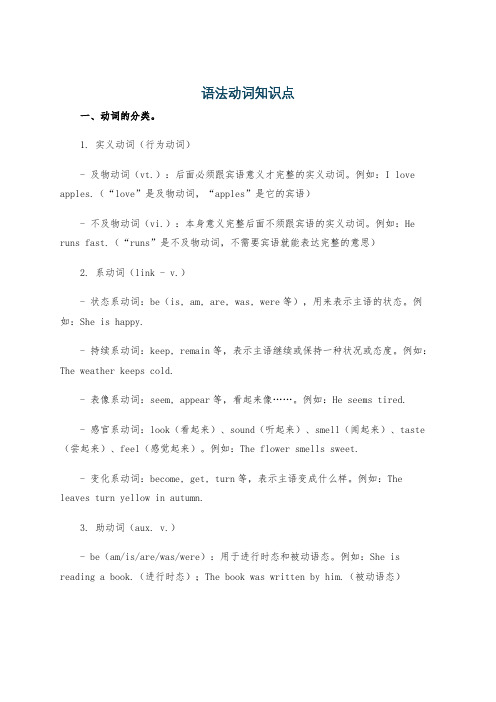
语法动词知识点一、动词的分类。
1. 实义动词(行为动词)- 及物动词(vt.):后面必须跟宾语意义才完整的实义动词。
例如:I love apples.(“love”是及物动词,“apples”是它的宾语)- 不及物动词(vi.):本身意义完整后面不须跟宾语的实义动词。
例如:He runs fast.(“runs”是不及物动词,不需要宾语就能表达完整的意思)2. 系动词(link - v.)- 状态系动词:be(is, am, are, was, were等),用来表示主语的状态。
例如:She is happy.- 持续系动词:keep, remain等,表示主语继续或保持一种状况或态度。
例如:The weather keeps cold.- 表像系动词:seem, appear等,看起来像……。
例如:He seems tired.- 感官系动词:look(看起来)、sound(听起来)、smell(闻起来)、taste (尝起来)、feel(感觉起来)。
例如:The flower smells sweet.- 变化系动词:become, get, turn等,表示主语变成什么样。
例如:The leaves turn yellow in autumn.3. 助动词(aux. v.)- be(am/is/are/was/were):用于进行时态和被动语态。
例如:She is reading a book.(进行时态);The book was written by him.(被动语态)- do/does/did:用于构成疑问句和否定句,以及强调句等。
例如:Do you like music?(疑问句);He doesn't go to school on Sunday.(否定句);I do love you.(强调句)- have/has/had:用于完成时态。
例如:I have finished my homework.4. 情态动词(modal v.)- can/could:表示能力(过去式为could)、许可(在口语中常用)等。
初中语法讲解系列(附练习)-动词1(实义动词、连系动词、助动词)
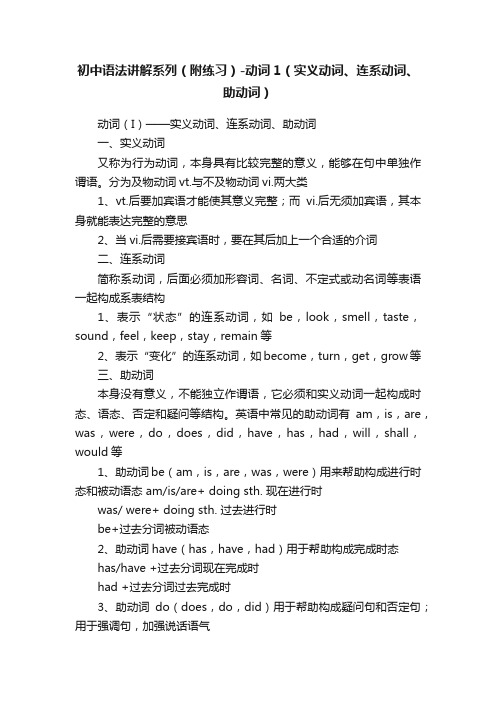
初中语法讲解系列(附练习)-动词1(实义动词、连系动词、助动词)动词(I)——实义动词、连系动词、助动词一、实义动词又称为行为动词,本身具有比较完整的意义,能够在句中单独作谓语。
分为及物动词vt.与不及物动词vi.两大类1、vt.后要加宾语才能使其意义完整;而vi.后无须加宾语,其本身就能表达完整的意思2、当vi.后需要接宾语时,要在其后加上一个合适的介词二、连系动词简称系动词,后面必须加形容词、名词、不定式或动名词等表语一起构成系表结构1、表示“状态”的连系动词,如be,look,smell,taste,sound,feel,keep,stay,remain等2、表示“变化”的连系动词,如become,turn,get,grow等三、助动词本身没有意义,不能独立作谓语,它必须和实义动词一起构成时态、语态、否定和疑问等结构。
英语中常见的助动词有am,is,are,was,were,do,does,did,have,has,had,will,shall,would等1、助动词be(am,is,are,was,were)用来帮助构成进行时态和被动语态 am/is/are+ doing sth. 现在进行时was/ were+ doing sth. 过去进行时be+过去分词被动语态2、助动词have(has,have,had)用于帮助构成完成时态has/have +过去分词现在完成时had +过去分词过去完成时3、助动词do(does,do,did)用于帮助构成疑问句和否定句;用于强调句,加强说话语气Do be quiet,children!4、助动词shall和will用于构成将来时,shall仅用于第一人称,will可用于任何人称will/shall + v.一般将来时would/should + v.过去将来时课堂练习1.By the time I got outside, the school bus (leave).2.In order to provide better services for foreigners during the 2nd Y outh Olympic Games, lots of bus and taxi drivers are busy (learn) English.3.Y esterday I a new dress at the Macy's for my mum.( buy)4.When I got home, my pet dog (lie) on the floor, dead.5.We are looking forward to (visit) Shanghai World Expo.6.Many school things were (send) to Yushu last month.7.There is nothing important in today's newspaper. How about (listen) to the radio?8.At weekends, Nancy enjoys (read) comic books at home.9.I don't like eating lemon. It t too sour.10.Would you like to (分享) your experiences with us?课后作业1.—When did your uncle in Shanghai?—The day before yesterday.A. arriveB. getC. reachD. go/doc/253293586.html,st Sunday my aunt at home with me. We were watching TV all dayA. wasB. wereC. isD. are3.This silk dress so smooth. It's made in China.A. feelsB. smellsC. soundsD. tastes4.How's Annie? I her for a long time.A. don't seeB. won't seeC. didn't seeD. haven't seen5.—When Jessy to New Y ork?—Y esterday.A. does; getB. did; getC. has; gotD. had; got6.—Where is Ben?—He to the teachers' office. He will be back soon.A. goB. has goneC. has beenD. goes7.—Do you often watch Man and Nature on TV? —Sometimes. It's an interesting program, but I Sports News.A. preferB. wantC. enjoyD. miss8.Everyone I come from Sichuan. Actually, I come from Shandong.A. findB. thinkC. findsD. thinks9.Y our homework is well done. Just some small mistakes in it.A. createB. connectC. correctD. control10.It's too bright and sunny. Why not your sun glasses?A.breakB. cleanC. makeD. wear11.The bus is coming. Be careful when you the bus.A. get onB. get offC. get upD. get to12.The plane will from Beijing Capital Airport and land in London.A. take upB. take outC. take awayD. take off13.—What is Mum cooking in the kitchen?—Fish, I guess. How nice it !B. soundsC. tastesD. smells14.—Thanks for your wonderful dinner. I have to go now.—It's raining hard. Don't until it stops.A. arriveB. stayC. comeD. leave15.The small child was not old enough to himself.A. haveB. wearC. dressD. put16.Don't others. Sometimes you make mistakes too.A. knock atB. laught atC. look atD. arrive at17.Doctors tell poeple their hands often and to stay home if they feel ill.A. to washB. washesC. washD. washing18.—Shall we stay at home watching TV tonight?—No, I'd like and see a movie.A.to goB. goD. going19.The classroom was so dirty. I decided .A. Clean it upB. To clean it upC. Clean up itD. Cleaning up it20.She was supposed in hospital, but poeple found her in the office.A. to lieB. lyingC. lieD. lies。
中考英语知识点梳理:动词讲解
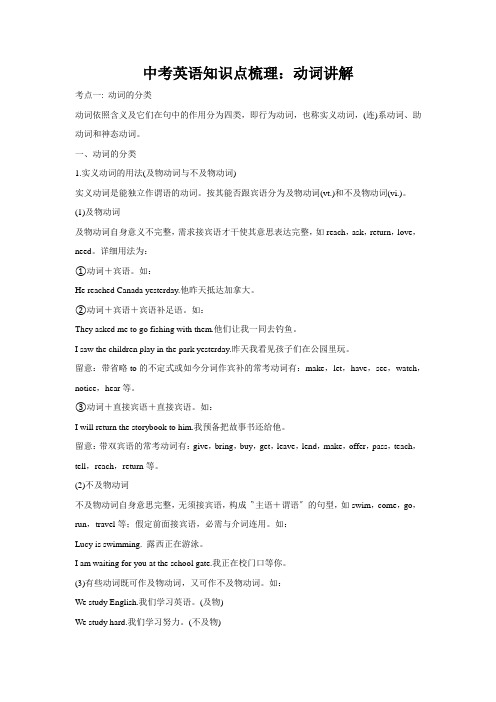
中考英语知识点梳理:动词讲解考点一: 动词的分类动词依照含义及它们在句中的作用分为四类,即行为动词,也称实义动词,(连)系动词、助动词和神态动词。
一、动词的分类1.实义动词的用法(及物动词与不及物动词)实义动词是能独立作谓语的动词。
按其能否跟宾语分为及物动词(vt.)和不及物动词(vi.)。
(1)及物动词及物动词自身意义不完整,需求接宾语才干使其意思表达完整,如reach,ask,return,love,need。
详细用法为:①动词+宾语。
如:He reached Canada yesterday.他昨天抵达加拿大。
②动词+宾语+宾语补足语。
如:They asked me to go fishing with them.他们让我一同去钓鱼。
I saw the children play in the park yesterday.昨天我看见孩子们在公园里玩。
留意:带省略to的不定式或如今分词作宾补的常考动词有:make,let,have,see,watch,notice,hear等。
③动词+直接宾语+直接宾语。
如:I will return the storybook to him.我预备把故事书还给他。
留意:带双宾语的常考动词有:give,bring,buy,get,leave,lend,make,offer,pass,teach,tell,reach,return等。
(2)不及物动词不及物动词自身意思完整,无须接宾语,构成〝主语+谓语〞的句型,如swim,come,go,run,travel等;假定前面接宾语,必需与介词连用。
如:Lucy is swimming. 露西正在游泳。
I am waiting for you at the school gate.我正在校门口等你。
(3)有些动词既可作及物动词,又可作不及物动词。
如:We study English.我们学习英语。
(及物)We study hard.我们学习努力。
2024年初中英语语法专题复习之动词讲义
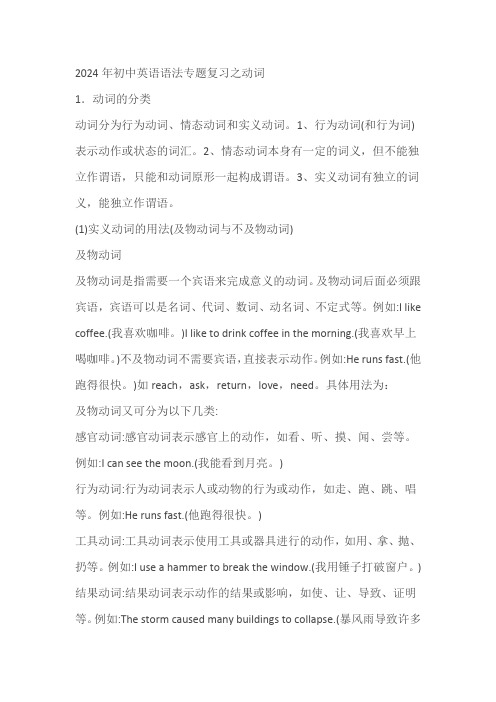
2024年初中英语语法专题复习之动词1.动词的分类动词分为行为动词、情态动词和实义动词。
1、行为动词(和行为词)表示动作或状态的词汇。
2、情态动词本身有一定的词义,但不能独立作谓语,只能和动词原形一起构成谓语。
3、实义动词有独立的词义,能独立作谓语。
(1)实义动词的用法(及物动词与不及物动词)及物动词及物动词是指需要一个宾语来完成意义的动词。
及物动词后面必须跟宾语,宾语可以是名词、代词、数词、动名词、不定式等。
例如:I like coffee.(我喜欢咖啡。
)I like to drink coffee in the morning.(我喜欢早上喝咖啡。
)不及物动词不需要宾语,直接表示动作。
例如:He runs fast.(他跑得很快。
)如reach,ask,return,love,need。
具体用法为:及物动词又可分为以下几类:感官动词:感官动词表示感官上的动作,如看、听、摸、闻、尝等。
例如:I can see the moon.(我能看到月亮。
)行为动词:行为动词表示人或动物的行为或动作,如走、跑、跳、唱等。
例如:He runs fast.(他跑得很快。
)工具动词:工具动词表示使用工具或器具进行的动作,如用、拿、抛、扔等。
例如:I use a hammer to break the window.(我用锤子打破窗户。
) 结果动词:结果动词表示动作的结果或影响,如使、让、导致、证明等。
例如:The storm caused many buildings to collapse.(暴风雨导致许多建筑倒塌。
)状态动词:状态动词表示状态或性质,如是、成为、有、保持等。
例如:She is a doctor.(她是一名医生。
)不及物动词不及物动词不需要宾语,直接表示动作。
例如:He walks quickly.(他走得很快。
)不及物动词又可分为以下几类:感官动词:感官动词表示感官上的动作,如看、听、摸、闻、尝等。
语法基础详解:动词的分类——实义动词,系动词,助动词与情态动词,太全了!
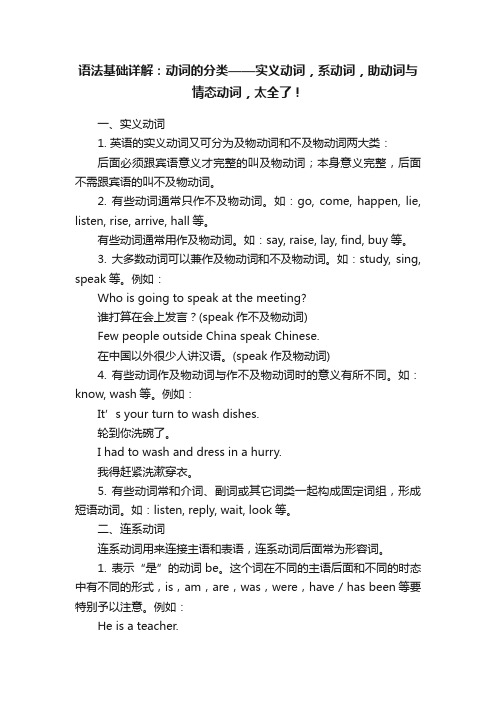
语法基础详解:动词的分类——实义动词,系动词,助动词与情态动词,太全了!一、实义动词1. 英语的实义动词又可分为及物动词和不及物动词两大类:后面必须跟宾语意义才完整的叫及物动词;本身意义完整,后面不需跟宾语的叫不及物动词。
2. 有些动词通常只作不及物动词。
如:go, come, happen, lie, listen, rise, arrive, hall等。
有些动词通常用作及物动词。
如:say, raise, lay, find, buy等。
3. 大多数动词可以兼作及物动词和不及物动词。
如:study, sing, speak等。
例如:Who is going to speak at the meeting?谁打算在会上发言?(speak作不及物动词)Few people outside China speak Chinese.在中国以外很少人讲汉语。
(speak作及物动词)4. 有些动词作及物动词与作不及物动词时的意义有所不同。
如:know, wash等。
例如:It’s your turn to wash dishes.轮到你洗碗了。
I had to wash and dress in a hurry.我得赶紧洗漱穿衣。
5. 有些动词常和介词、副词或其它词类一起构成固定词组,形成短语动词。
如:listen, reply, wait, look等。
二、连系动词连系动词用来连接主语和表语,连系动词后面常为形容词。
1. 表示“是”的动词be。
这个词在不同的主语后面和不同的时态中有不同的形式,is,am,are,was,were,have / has been等要特别予以注意。
例如:He is a teacher.他是个教师。
We are Chinese.我们是中国人。
2. 表示“感觉”的词,如look(看起来),feel(觉得,摸起来),smell(闻起来),sound(听起来),taste(尝起来)等。
初中英语语法归纳动词概说(思维导图+知识梳理+好题精炼)
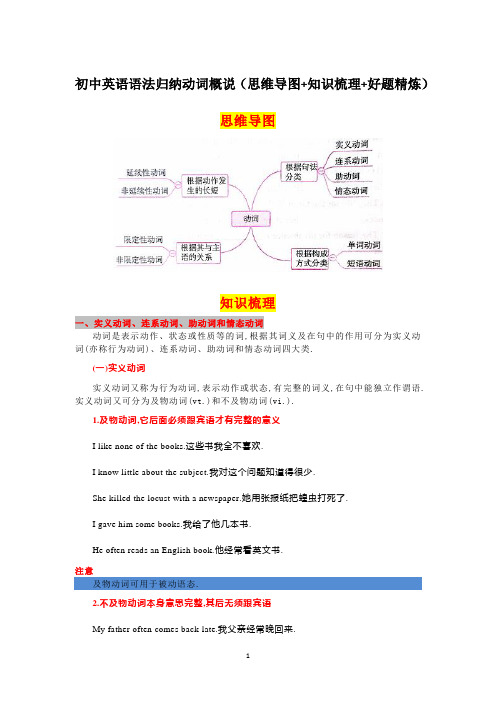
初中英语语法归纳动词概说(思维导图+知识梳理+好题精炼)思维导图知识梳理一、实义动词、连系动词、助动词和情态动词动词是表示动作、状态或性质等的词,根据其词义及在句中的作用可分为实义动词(亦称行为动词)、连系动词、助动词和情态动词四大类.(一)实义动词实义动词又称为行为动词,表示动作或状态,有完整的词义,在句中能独立作谓语.实义动词又可分为及物动词(vt.)和不及物动词(vi.).1.及物动词,它后面必须跟宾语才有完整的意义I like none of the books.这些书我全不喜欢.I know little about the subject.我对这个问题知道得很少.She killed the locust with a newspaper.她用张报纸把蝗虫打死了.I gave him some books.我给了他几本书.He often reads an English book.他经常看英文书.注意及物动词可用于被动语态.2.不及物动词本身意思完整,其后无须跟宾语My father often comes back late.我父亲经常晚回来.The sun shone brightly this morning.今天早晨阳光灿烂.不及物动词不能直接接名词,如果要接名词,要在动词和名词之间加介词或副词.I looked for my watch every place but I didn't find it.我到处找我的表,但是没找到.I'll wait for you until eight o'clock.我将等你到八点钟.有一些动词既可作及物动词,又可作不及物动词.如何区别它们,就看它们后面是否直接接名词作宾语.She sings very well.她歌唱得很好.(用作不及物动词)She sings English songs very well.她唱英语歌唱得很好.(用作及物动词)(二)连系动词它本身有一定词义,但不能单独作谓语,必须与表语一起构成系表结构.连系动词可以分为三类:1.单纯表示一个特征或状态用得最多的是be(是、在),另外还有feel(觉得、摸上去),look(看起来),sound(听起来),taste(尝起来),seem(似乎是),appear(显得、看来好像)等.The flowers look beautiful.这些花看上去很漂亮.She is a very good student.她是个非常好的学生.The cake smells strange.这蛋糕有怪味.Her voice sounds sweet.她的嗓音很甜美.I'm not feeling well. I often feel tired.我感觉不舒服.我常常感到疲劳.The medicine tastes terrible.这种药太难吃了.2.表示变成某种状态这样的动词有become(变成),come(成为),fall(变得),get(变得),grow(渐渐变得),run(变成),turn(变为),go(变成),prove(证明),make(变为).His grandma is growing very old.他的祖母年纪很大了.It's getting darker and darker.天越来越黑了.He became a doctor three years ago.他3年前当上了医生.His face turned pale. He must be ill.他的脸变得苍白,他一定是病了.He fell asleep.他睡着了.The meat has gone bad.肉变坏了.The river ran dry(=stopped flowing)during the drought.这条河在干旱期间断流了.3.表示保持某种状态这样的动词有continue(仍旧是),keep(保持),lie(处于······状态),remain(仍是),,stand(处于···状态),stay(继续处于······状态)等.Keep quiet, please.请安静.You must look after yourself and keep healthy.你要照顾好自己,保持身体健康.The weather continued fine for several days.一连好几天天气都很好.Shops remained open till late in the evening.商店开到晚上很晚的时候.The window stayed open all the night.窗子整夜开着.The house stood empty for a long time.那所房子空了好长一段时间.4.表示感觉或知觉的连系动词常用来表示人的感觉或知觉的连系动词有feel, taste, smell, sound和look,分别相当于汉语中的“摸起来,感觉”“尝起来”“闻起来”“听起来”“看上去”的概念.后面通常接形容词作表语,也可接介词短语like.The music sounds beautiful.这段音乐听起来很优美.The rock looked like a tiger.这块岩石看上去像只老虎.(三)助动词本身没有词义,不能独立作谓语,必须和主要动词一起构成谓语,表示否定、疑问、时态、语态等语法形式.常见的助动词有:be, do, have, shall, will等.She is doing her homework now.她现在正在做家庭作业.What have you been doing these days?你这些天一直在做什么?I'll be meeting them at the station.我将去车站接他们.Does anyone ever take them to school?有人送他们去上学吗?Did anyone sharpen this knife?有人把刀磨利了吗?(四)情态动词表示说话人对某一动作或状态的态度,或表示主观设想.情态动词有实际的词义,但词义不完全,不可单独作谓语,须同动词原形连用,不随人称和数而变化.情态动词所表示的情态有:命令、允诺、请求、愿望、愿意、义务、必要、可能、能力、需要等.初中阶段应掌握的情态动词有:can/could, may/might, must, shall/should, will/would, need.如:Ask Miss Gao. She may tell you why,去问高老师.她可能会告诉你原因.Need we hand in our exercise-books before class?我们需要在上课前交练习本吗?You shouldn't do that.你不该做那件事.二、单词动词和短语动词动词根据其构成方式还可分单词动词和短语动词(一)单词动词就是由一个单词构成的动词,如:live, work, study, learn, come, go, hit, strike等.(二)短语动词主动词还可由两个或两个以上的单词构成,这就是“短语动词”.短语动词大多由动词与介词/副词等搭配而成.在使用中,我们要将短语动词当作一个整体来使用.短语动词主要有以下几种类型.1.动词+介词go over复习,listen to 听,think about 考虑,look for寻找,rely on依靠,depend on 依靠,look into 调查,play with和······一起玩,send for派人去请,consist of由·····组成,arrive at 到达等.这类短语动词相当于及物动词,须跟宾语.Stop talking and listen to me carefully.停止说话,认真听我讲课.Who is waiting for you?谁在等你?2.动词+副词eat up 吃光,give up 放弃,hold up 举起,put on穿;上演,take place 发生,turn on打开,try on试穿,等它们构成新的词义,有的用作及物动词,有的用作不及物动词.Please wake me up at 5:00 tomorrow morning.请在明天早晨5点钟唤醒我.Let me try it on.让我试穿一下.Please turn on the radio=Please turn the radio on.请打开收音机.点拨(1)如果动词+副词结构的宾语是代词,就必须把宾语插在动词和副词之间.Let him in.让他进去.He turned it on.他把它打开.(2)如果宾语是名词,该名词既可放在动词和副词之间,也可放在副词之后.They put the meeting off till next week.他们把会议推迟到下周召开.He turned off the light before he left the room.他离开房间前关上了灯.3.动词+副词+介词catch up with 赶上,get on with 与某人相处,go on with 继续,keep up with 跟上,do away with 废除,look down upon 轻视,look forward to 期待,keep away from脱离,等.这类短语动词相当于及物动词,后面须跟宾语.How are they getting along with their work?他们工作进展如何?Li Ping works hard all the time to catch up with the others.李平一直努力学习,目的是想赶上其他同学.If we don't finish painting the room today, we can go on with it tomorrow.要是今天房间粉刷不完,我们明天接着干.4.动词+名词+介词catch hold of(on)抓住,握住,give lessons to给······上课,make friends with 与······交朋友,take care of照料,pay attention to 注意,等.这类动词短语相当于及物动词,后面须跟宾语.We made friends with them during the trip.我们在旅途中和他们结为朋友.Take care of yourself.保重!5.动词+形容词+介词be fond of爱好,be familiar with 熟悉,be suitable for适合,be late for迟到,be good at 善于,be afraid of害怕,等.这类短语动词相当于及物动词,后面须跟宾语.My parents are strict with me.我父母对我要求严格.My brother is good at swimming.我弟弟擅长游泳.I'm looking forward to seeing you.我高兴地期望和你见面.Are you afraid of snakes?你怕蛇吗?I'm very fond of dancing.我很喜欢跳舞.Many people are fond of showing off.有许多人喜欢炫耀.三、延续性动词和非延续性动词英语中表示动作的动词,按其动作发生过程的长短,可分为延续性动词和非延续性动词.(一)延续性动词又叫持续性动词,它所表示的动作是一种延续的动作,这种动作可以延续下去或产生持久的影响.延续性动词可以与表示一段时间的状语连用,如“for+一段时间”“since+从句(一般过去时)”“since+时间点”,how long等.这样的动词有learn, work, stand, lie, walk, keep, have, wait, smoke, watch, sing, read, sleep, live等.We have known each other since childhood.自孩提时代我们就认识.I have been living here for years.我在这里住了多年了.They've been working from morning to night.他们从早到晚一直在干活儿.点拨延续性动词通常(如一般过去时)不可以和一个表示短暂的具体时间状语连用;若用于进行时态,则可以和表示具体时刻的时间状语连用.正:The boy was reading at six yesterday afternoon.正:The boy began to read at six yesterday afternoon.误:The boy read at six yesterday afternoon.(二)非延续性动词这种动词表示的动作不能延续,即动作发生后立即结束,产生某种结果.这样的动词有close, die, arrive, post, come, fall, leave, go, break, lose, give, join, receive,buy, borrow, become, start, happen, begin, finish, kill, marry等.The boy broke his arm yesterday.这男孩昨天把胳膊弄折了.He went to Shanghai two weeks ago.两个星期前,他去上海了.It happened after three years.事情发生于三年后.如上所述,非延续性动词的肯定式不能与for, since引导的表示一段时间的短语或从句连用.点拨(1)用“(一段时间)+ago”代替“for+-段时间”或用“It is+(一段时间)+sin ce”或用“(一段时间)+has passed+ since”.(2)将非延续性动词(词组)改成be+形容词(副词、名词、介词短语等)或相近的延续性动词.四、限定性动词和非限定性动词英语动词还可以根据其与主语的关系分为限定动词和非限定动词.限定动词在句子中起谓语作用,可与助动词或情态动词连用,但必须与主语在人称和数上保持一致.(一)限定性动词The coat is much too big for me.这衣服我穿太大了.They haven't arrived at an agreement.他们尚未达成协议.He goes to school every day.他每天上学.They were preparing for the party last week.上周他们正为聚会做准备.(二)非限定性动词英语主动词有三种非限定形式,它们是不定式(包括带to的和不带to的不定式),-ing分词和-ed分词,它们在句中不起谓语作用,而可以起主语、宾语、补语、状语、定语等作用.它们不受主语的人称和数的制约.I want Bill to come with me.我想要比尔跟我一道去.I heard him lock the door.我听到他锁门了.I must get my bike repaired.我必须叫人修一下我的自行车.Doing this can save a lot of time and money.这样做可以节省很多时间和钱.I can't help laughing.我忍不住笑了.好题精练一、选择填空1.No one knew why Miss Black_________ the new boxes.A. has brokenB. had brokenC. would have brokenD. have broken2.-Where are you_________?-At the Grand Hotel.A. stayingB. livingC. remainingD. stopping3.Don't keep on_________ the book.A. findingB. seeingC. borrowingD. reading4.What a fine day, _________.A. what are theyB. won't itC. isn't itD. No, it isn't5.The stranger told us his name after we_________ him twice.A. askedB. have askedC. were askingD. had asked6.Today is Saturday. Tomorrow_________ Sunday.A. is going toB. willC. will beD. is going to be7.Don't worry, the train_________ yet.A. arrivedB. won't arriveC. has arrivedD. hasn't arrived8.Tim_________ the army for three years.A. has joinedB. has taken part inC. has attentedD. has been in9.I believe she'll always keep what you_________ her.A. have just givenB. just gaveC. won't giveD. had given10.One morning while I_________ along the street, I_________ an old man crying.A. walking; heardB. walked; heardC. was walking; was hearingD. was walking; heard答案:1-5BADCD 6-10CDDAD二、改正下列句中的错误1.The old man is dieing._________________________________________________________________________ ___2.They entered into the hall one after another._________________________________________________________________________ ___3.Before liberation the Yellow River often overflew its banks._________________________________________________________________________ ___4.She married with a rich man at the age of twenty._________________________________________________________________________ ___5.The cake tasted well._________________________________________________________________________ ___6.What did they discuss about at the meeting?_________________________________________________________________________ ___7.The sun raises in the east._________________________________________________________________________ ___8.We ought study hard for the people._________________________________________________________________________ ___9.I have put up the map on the wall an hour ago._________________________________________________________________________ ___10.Do you agree me on this point?_________________________________________________________________________ ___答案:1.dieing→dying2.去掉into3.overflew→overflowed4.去掉with5.well→good6.去掉about7.raises→rises8.ought→ought to9.have put up→ put up10.agree后加with。
初中英语语法讲解-动词
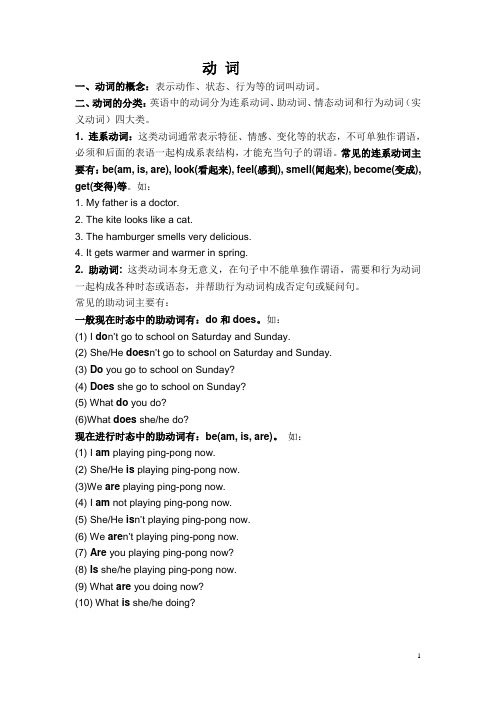
动词一、动词的概念:表示动作、状态、行为等的词叫动词。
二、动词的分类:英语中的动词分为连系动词、助动词、情态动词和行为动词(实义动词)四大类。
1. 连系动词:这类动词通常表示特征、情感、变化等的状态,不可单独作谓语,必须和后面的表语一起构成系表结构,才能充当句子的谓语。
常见的连系动词主要有:be(am, is, are), look(看起来), feel(感到), smell(闻起来), become(变成), get(变得)等。
如:1. My father is a doctor.2. The kite looks like a cat.3. The hamburger smells very delicious.4. It gets warmer and warmer in spring.2. 助动词: 这类动词本身无意义,在句子中不能单独作谓语,需要和行为动词一起构成各种时态或语态,并帮助行为动词构成否定句或疑问句。
常见的助动词主要有:一般现在时态中的助动词有:do和does。
如:(1) I do n’t go to school on Saturday and Sunday.(2) She/He does n’t go to school on Saturday and Sunday.(3) Do you go to school on Sunday?(4) Does she go to school on Sunday?(5) What do you do?(6)What does she/he do?现在进行时态中的助动词有:be(am, is, are)。
如:(1) I am playing ping-pong now.(2) She/He is playing ping-pong now.(3)We are playing ping-pong now.(4) I am not playing ping-pong now.(5) She/He is n’t playing ping-pong now.(6) We are n’t playing ping-pong now.(7) Are you playing ping-pong now?(8) Is she/he playing ping-pong now.(9) What are you doing now?(10) What is she/he doing?一般将来时态中的助动词有:be going to结构中的be(am, is are), will和shall。
中考英语语法一轮复习——动词讲解及练习
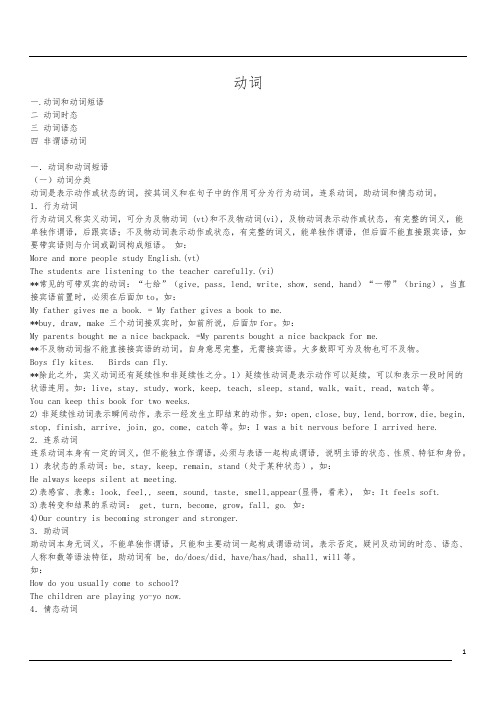
动词一.动词和动词短语二动词时态三动词语态四非谓语动词一.动词和动词短语(一)动词分类动词是表示动作或状态的词,按其词义和在句子中的作用可分为行为动词,连系动词,助动词和情态动词。
1.行为动词行为动词又称实义动词,可分为及物动词 (vt)和不及物动词(vi),及物动词表示动作或状态,有完整的词义,能单独作谓语,后跟宾语;不及物动词表示动作或状态,有完整的词义,能单独作谓语,但后面不能直接跟宾语,如要带宾语则与介词或副词构成短语。
如:More and more people study English.(vt)The students are listening to the teacher carefully.(vi)**常见的可带双宾的动词:“七给”(give, pass, lend, write, show, send, hand)“一带”(bring),当直接宾语前置时,必须在后面加to。
如:My father gives me a book. = My father gives a book to me.**buy, draw, make 三个动词接双宾时,如前所说,后面加for。
如:My parents bought me a nice backpack. =My parents bought a nice backpack for me.**不及物动词指不能直接接宾语的动词。
自身意思完整,无需接宾语。
大多数即可为及物也可不及物。
Boys fly kites. Birds can fly.**除此之外,实义动词还有延续性和非延续性之分。
1)延续性动词是表示动作可以延续,可以和表示一段时间的状语连用。
如:live,stay, study, work, keep, teach, sleep, stand, walk, wait, read, watch等。
You can keep this book for two weeks.2)非延续性动词表示瞬间动作,表示一经发生立即结束的动作。
初一英语动词语法知识总结(讲解+考点+综合练习)动词
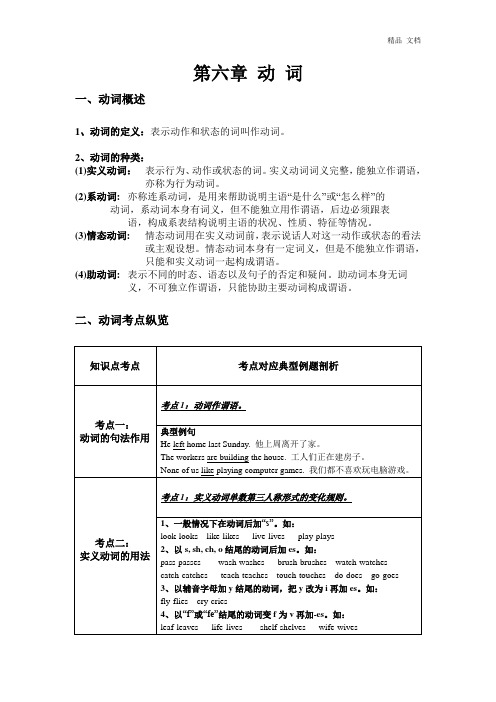
第六章动词一、动词概述1、动词的定义:表示动作和状态的词叫作动词。
2、动词的种类:(1)实义动词:表示行为、动作或状态的词。
实义动词词义完整,能独立作谓语,亦称为行为动词。
(2)系动词: 亦称连系动词,是用来帮助说明主语“是什么”或“怎么样”的动词,系动词本身有词义,但不能独立用作谓语,后边必须跟表语,构成系表结构说明主语的状况、性质、特征等情况。
(3)情态动词: 情态动词用在实义动词前,表示说话人对这一动作或状态的看法或主观设想。
情态动词本身有一定词义,但是不能独立作谓语,只能和实义动词一起构成谓语。
(4)助动词: 表示不同的时态、语态以及句子的否定和疑问。
助动词本身无词义,不可独立作谓语,只能协助主要动词构成谓语。
二、动词考点纵览三、综合练习1、系动词和助动词的用法( ) 1. The fish very delicious.A. smellsB. tastesC. looksD. sounds ( ) 2. What Mrs. White said sounds____.A. friendlyB. wonderfullyC. pleasantlyD. nicely ( ) 3. The poor girl ____ blind at the age of four.A. turnedB. goesC. becameD. went ( ) 4. When she was a child she____ .A. grew patienceB. was aliveC. ran wildD. came true ( ) 5. Her voice____ as if she has a cold.A. soundsB. listensC. hearsD. seems ( ) 6. This skirt___ as if it is made of cotton.A. isB. looksC. feelsD. seems ( ) 7. She looks ___ she hadn’t had a good meal for a week.A. thatB. as ifC. whenD. so far精品文档( ) 8. It ____that he was late for the bus.A. looksB. turnsC. getsD. seems( ) 9. These oranges taste_____.A. to be goodB. to be wellC. wellD. good( ) 10. ---Do you like the skirt?---Yes, it ____ very soft.A. feelsB. feltC. is feelingD. is felt( ) 11. The moment Mr. Green went to bed, he____ asleep.A. keptB. gotC. fellD. fall( ) 12. When I went home yesterday, it was ____ dark.A. goingB. gettingC. runningD. coming( ) 13. His plan ____ to be a perfect one.A. provedB. was provedC. is provingD. proving( ) 14. The flowers in the garden ____ sweet.A. soundB. tasteC. becomeD. smell( ) 15. He____ like his father in character.A. looksB. seemsC. isD. feels( ) 16. It____ another fine day tomorrow.A. seemsB. promisesC. appearsD. looks( ) 17. She ____ much younger than she really is.A. appearsB. growsC. becomesD. turns( ) 18. You____ very pale. Do you feel sick?A. lookedB. lookC. lookingD. are looked( ) 19. His wish to become a policeman has ____true.A. turnedB. realizedC. comeD. grown( ) 20. Her father ____a pilot.A. turnedB. grewC. has turnedD. has become( ) 21. Penny and I _______in Canada now.A. livesB. livingC. are livingD. lived( ) 22. Su Hai is _____to Canada.A. comeB. comingC. comesD. came( ) 23. Did you ______a good trip?A. haveB. hasC. hadD. having( ) 24. I’ll _____you the rooms in my house.A. showingB. to showC. showD. shows( ) 25.You can ______your hands in the bathroom.A. washesB. washedC. washD. washing2、情态动词的用法( ) 1. John___ come to see us tonight, but he isn’t very sure yet.A.mayB. canC. has toD. must( ) 2. They ___ do well in the exam.A. can be able toB. be able toC. can able toD. are able to( ) 3. ---May I take this book out?A. can’tB. may notC. needn’tD. aren’t( ) 4. You___ go and see a doctor at once because you’ve got a fever.A. canB. mustC. dareD. would( ) 5. ---Can you speak Japanese?---No, I____.A. mustn’tB. can’tC. needn’tD. may not( ) 6. ---He___ be in the classroom, I think.---No, he ___ be in the classroom. I saw him go home a minute ago.A. can; may notB. must; may notC. may; can’tD. may; mustn’t( ) 7. ---Shall I get one more cake for you, Dad?---Thanks, but you___, I’ve had enough.A. may notB. must notC. can’tD. needn’t( ) 8. Even the top students in our class can’t work out this problem, so it be very difficult.A. mayB. mustC. canD. need( ) 9. He isn’t at school. I think he ___ be ill.A. canB. shallC. mustD. has to( ) 10. ___ I take this one?A. MayB. WillC. AreD. Do( ) 11. The children___ play football on the road.A. can’tB. canC. mustn’tD. must( ) 12. You ___ be late for school again next time.A. mustn’tB. needn’tC. don’t have toD. don’t need to( ) 13. ---Must I do my homework at once?---No, you___.A. needn’tB. mustn’tC. can’tD. may not( ) 14. His arm is all right. He___ go and see the doctor.A. has not toB. don’t have toC. haven’t toD. doesn’t h ave to( ) 15. He had to give up the plan, ___ he?A. didB. didn’tC. doesD. doesn’t( ) 16. They had to walk here, ___ they?A. mustn’tB. didC. didn’tD. hadn’t( ) 17. He had better stay here, ___ he?A. didn’tB. don’tC. hadn’tD. isn’t( ) 18. You’d better___late next time.A. not to beB. not beC. won’t beD. don’t be( ) 19. You’d better ___ your hair ___ once a month.A. had; cutB. had; cuttedC. have; cutD. have; cutted( ) 20. You___ ask that man over there. Maybe he knows the way.A. had better not toB. had not betterC. had betterD. had better not( ) 21. ---Shall we go and visit the History Museum next Sunday?--- .A. Here you areB. Sorry, I can’tC. Yes, pleaseD. Let me try( ) 22. ---Why don’t you ask Mike to go with us?A. I willB. I won’tC. I canD. I may( ) 23. ---___ I take the newspaper away?---No, you mustn’t. You____read it only here.A. Must; canB. May; canC. Need; mustD. Must; must( ) 24. Excuse me,___ you please pass me that cup?A. doB. shouldC. wouldD. must( ) 25. ___ you like to have another try?A. CouldB. WillC. WouldD. Do( ) 26. ---Would you like to go boating with us?---Yes, ___.A. I’d likeB. I wantC. I’d like toD. I do( ) 27. You___ worry about your son. He will get well soon.A. needn’tB. can’tC. mustn’tD. have to( ) 28. The poor man needs our help, ___ he?A. needB. do esn’tC. doesD. needn’t( ) 29. ---Must we do our homework now?---No, you___. You may have a rest first.A. mustn’tB. needn’tC. may notD. can’t( ) 30. Can you speak Japanese? No, I_____A. mustn’tB. can’tC. nee dn’tD. may not3、动词不定式、动名词和分词的用法( ) 1. Where is my passport? I remember______it here.You did not left it here. Remember_____it with you all the time.A. to put; to takeB. putting; to takeC. to put; takingD. putting; taking( ) 2. The tourists enjoy________ on the beach.A. lieB. liesC. lyingD. lay( ) 3. Would you like _________to the theatre with me?A. to goB. goingC. goD. be going( ) 4. They find it _________with animals.A. interesting to playB. interested to playC. interesting playingD. interested playing( ) 5. Would you mind_____quiet for a moment? I’m trying_____a form.A. keeping; to fill outB. keeping; fill outC. to keep; to fill outD. to keep; fill out( ) 6. Grandma said that she had a lot of trouble________your handwriting.A. to readB. to seeC. readingD. in seeing( ) 7. The thief took away the woman’s wallet without____ anything.A. sayingB. sayC. saidD. to say( ) 8. Please stop ____, boys, I have something important to ____ you.A. saying; talkB. telling; sayC. talking; speakD. talking; tell( ) 9. What about ____ double quantities of everything today? We have hardly time to go____ next week.A. buying; to shopB. buy; shoppingC. buying; shoppingD. to buy; shopping( ) 10. After ____ for the job, you will be required to take a language test.A. being appliedB. appliedC. applyingD. apply( ) 11. ---Why were you so late for work today?---____ to the office was very slow this morning because of the traffic.A. DrivingB. DrivesC. DriveD. Drove( ) 12. How can you keep the machine ____when you are away?A. runB. to runC. runningD. being run( ) 13. It was impolite of him ____without ____goodbye.A. to leave; sayingB. leaving; to sayC. to leave; to sayD. leaving; saying( ) 14. ---Why was Fred so sad?---He isn’t used ____ alone.A. beB. to beC. to beingD. having been( ) 15. After finishing his homework he went on______a letter to his parents.A. writeB. writingC. to writeD. wrote参考答案1、系动词和助动词的用法1. B2. A3. D4. C5. A6. C7. B8. D9. D 10. A 11. C 12. B 13. A 14. D 15. C 16. B 17. C 18. B 19. C 20. D 21. C 22. B 23. A 24. C 25. C2、情态动词的用法1. A2. D3. A4. B5. B6. C7. D8. B9. C 10. A 11. C 12. A 13. A 14. D 15. B 16. C 17. A 18. B 19. C 20. C 21. B22. A 23. B 24. C 25. C 26. C 27. A 28. B 29. B 30. B3、动词不定式、动名词和分词的用法1. B2. C3. A4. A5. A6. C7. A8. D9. C 10. C 11. A 12. C 13. A 14. C 15. C文档说明(Word文档可以删除编辑)专注于精品文档:中考、高考、数学语文英语试卷、高中复习题目、小学试卷教案合同协议施工组织设计、期中、期末等测试,本文档目的是为了节省读者的工作时间,提高读者的工作效率,读者可以放心下载文档进行编辑使用.文档来源网络改编,审核有可能疏忽,如果有错误或侵权,请联系本店马上删除。
(完整版)初中英语动词讲解与练习(可编辑修改word版)
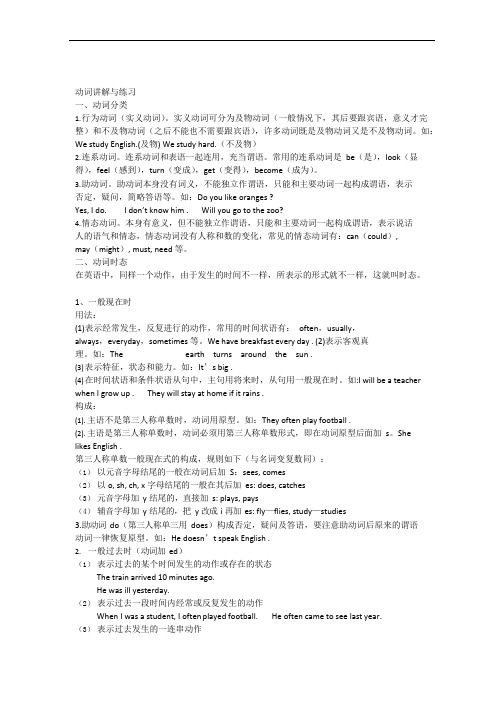
动词讲解与练习一、动词分类1.行为动词(实义动词)。
实义动词可分为及物动词(一般情况下,其后要跟宾语,意义才完整)和不及物动词(之后不能也不需要跟宾语),许多动词既是及物动词又是不及物动词。
如:We study English.(及物) We study hard.(不及物)2.连系动词。
连系动词和表语一起连用,充当谓语。
常用的连系动词是be(是),look(显得),feel(感到),turn(变成),get(变得),become(成为)。
3.助动词。
助动词本身没有词义,不能独立作谓语,只能和主要动词一起构成谓语,表示否定,疑问,简略答语等。
如:Do you like oranges ?Yes, I do. I don’t know him . Will you go to the zoo?4.情态动词。
本身有意义,但不能独立作谓语,只能和主要动词一起构成谓语,表示说话人的语气和情态,情态动词没有人称和数的变化,常见的情态动词有:can(could),may(might), must, need 等。
二、动词时态在英语中,同样一个动作,由于发生的时间不一样,所表示的形式就不一样,这就叫时态。
1、一般现在时用法:(1)表示经常发生,反复进行的动作,常用的时间状语有:often,usually,always,everyday,sometimes 等。
We have breakfast every day . (2)表示客观真理。
如:The earth turns around the sun .(3)表示特征,状态和能力。
如:It’s big .(4)在时间状语和条件状语从句中,主句用将来时,从句用一般现在时。
如:I will be a teacher when I grow up . They will stay at home if it rains .构成:(1).主语不是第三人称单数时,动词用原型。
- 1、下载文档前请自行甄别文档内容的完整性,平台不提供额外的编辑、内容补充、找答案等附加服务。
- 2、"仅部分预览"的文档,不可在线预览部分如存在完整性等问题,可反馈申请退款(可完整预览的文档不适用该条件!)。
- 3、如文档侵犯您的权益,请联系客服反馈,我们会尽快为您处理(人工客服工作时间:9:00-18:30)。
动词(I)——实义动词、连系动词、助动词
一、实义动词
又称为行为动词,本身具有比较完整的意义,能够在句中单独作谓语。
分为及物动词vt.与不及物动词vi.两大类
1、vt.后要加宾语才能使其意义完整;而vi.后无须加宾语,其本身就能表达完整的意思
2、当vi.后需要接宾语时,要在其后加上一个合适的介词
二、连系动词
简称系动词,后面必须加形容词、名词、不定式或动名词等表语一起构成系表结构
1、表示“状态”的连系动词,如be,look,smell,taste,sound,feel,keep,stay,remain等
2、表示“变化”的连系动词,如become,turn,get,grow等
三、助动词
本身没有意义,不能独立作谓语,它必须和实义动词一起构成时态、语态、否定和疑问等结构。
英语中常见的助动词有am,is,are,was,were,do,does,did,have,has,had,will,shall,would等
1、助动词be(am,is,are,was,were)用来帮助构成进行时态和被动语态 am/is/are+ doing sth. 现在进行时
was/ were+ doing sth. 过去进行时
be+过去分词被动语态
2、助动词have(has,have,had)用于帮助构成完成时态
has/have +过去分词现在完成时
had +过去分词过去完成时
3、助动词do(does,do,did)用于帮助构成疑问句和否定句;用于强调句,加强说话语气
Do be quiet,children!
4、助动词shall和will用于构成将来时,shall仅用于第一人称,will可用于任何人称
will/shall + v.一般将来时
would/should + v.过去将来时
课堂练习
1.By the time I got outside, the school bus (leave).
2.In order to provide better services for foreigners during the 2nd Youth Olympic Games, lots of bus and taxi drivers are busy (learn) English.
3.Yesterday I a new dress at the Macy's for my mum.( buy)
4.When I got home, my pet dog (lie) on the floor, dead.
5.We are looking forward to (visit) Shanghai World Expo.
6.Many school things were (send) to Yushu last month.
7.There is nothing important in today's newspaper. How about (listen) to the radio?
8.At weekends, Nancy enjoys (read) comic books at home.
9.I don't like eating lemon. It t too sour.
10.Would you like to (分享) your experiences with us?
课后作业
1.—When did your uncle in Shanghai?
—The day before yesterday.
A. arrive
B. get
C. reach
D. go
st Sunday my aunt at home with me. We were watching TV all day
A. was
B. were
C. is
D. are
3.This silk dress so smooth. It's made in China.
A. feels
B. smells
C. sounds
D. tastes
4.How's Annie? I her for a long time.
A. don't see
B. won't see
C. didn't see
D. haven't seen
5.—When Jessy to New York?
—Yesterday.
A. does; get
B. did; get
C. has; got
D. had; got
6.—Where is Ben?
—He to the teachers' office. He will be back soon.
A. go
B. has gone
C. has been
D. goes
7.—Do you often watch Man and Nature on TV?
—Sometimes. It's an interesting program, but I Sports News.
A. prefer
B. want
C. enjoy
D. miss
8.Everyone I come from Sichuan. Actually, I come from Shandong.
A. find
B. think
C. finds
D. thinks
9.Your homework is well done. Just some small mistakes in it.
A. create
B. connect
C. correct
D. control
10.It's too bright and sunny. Why not your sun glasses?
A.break
B. clean
C. make
D. wear
11.The bus is coming. Be careful when you the bus.
A. get on
B. get off
C. get up
D. get to
12.The plane will from Beijing Capital Airport and land in London.
A. take up
B. take out
C. take away
D. take off
13.—What is Mum cooking in the kitchen?
—Fish, I guess. How nice it !
A. looks
B. sounds
C. tastes
D. smells
14.—Thanks for your wonderful dinner. I have to go now.
—It's raining hard. Don't until it stops.
A. arrive
B. stay
C. come
D. leave
15.The small child was not old enough to himself.
A. have
B. wear
C. dress
D. put
16.Don't others. Sometimes you make mistakes too.
A. knock at
B. laught at
C. look at
D. arrive at
17.Doctors tell poeple their hands often and to stay home if they feel ill.
A. to wash
B. washes
C. wash
D. washing
18.—Shall we stay at home watching TV tonight?
—No, I'd like and see a movie.
A.to go
B. go
C. went
D. going
19.The classroom was so dirty. I decided .
A. Clean it up
B. To clean it up
C. Clean up it
D. Cleaning up it
20.She was supposed in hospital, but poeple found her in the office.
A. to lie
B. lying
C. lie
D. lies。
